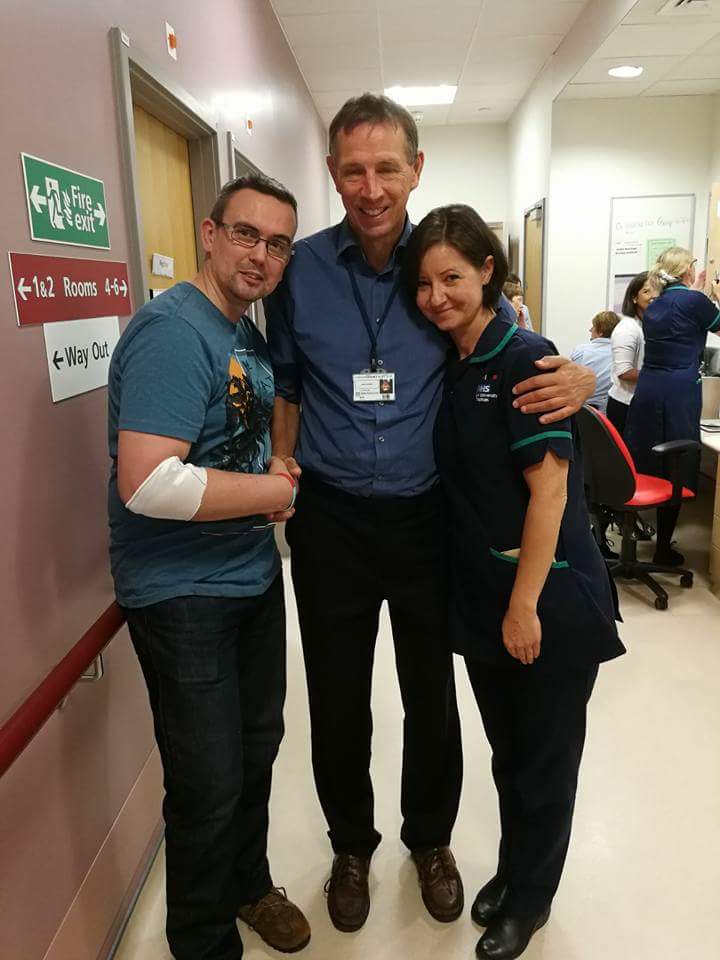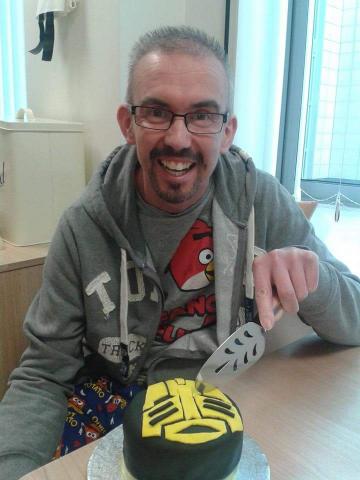Mike was first diagnosed with non-Hodgkin lymphoma in 2001. Since then, he has experienced a diagnosis of acute myeloid leukaemia (AML), relapsed twice, and has had two stem cell transplants.
Now in remission, Mike spoke to Caroline in Patient Services about his story, how he has coped, and the advice he has for other patients who may be going through relapse.
You’ve been through a lot, Mike. You’ve had two transplants and your recovery has not been straightforward. Before having a stem cell transplant, did you feel that you knew what to expect?
My first diagnosis was non-Hodgkin lymphoma in 2001. I’d had a little cough but didn’t think anything of it until I got a kick to the ribs during football, and they found a shadow when I had a scan.
I was living with my sister at the time, and my parents had just moved to Cyprus. My worst fear was letting everyone know. I was only 27, it was daunting. I thought, ‘I haven’t lived yet – there are so many things I want to do.’
I read up on bits and pieces but, in all honesty, I didn’t know what to expect. I just put myself in my own little bubble. It was a coping mechanism.
As part of your recovery, you’ve also experienced relapse. This is not something that everyone will understand. Can you tell us a bit about your first relapse?
My first transplant was in 2002 and my first relapse was a year later when I was 28. I felt as if the cancer hadn’t fully gone, and you just know in yourself when you’re not well. I took myself off for a blood test and found out that the cancer was back.
My parents had to come home from Cyprus permanently. I was readmitted to hospital, but by that point I knew a lot of the nurses already. They remembered me and that helped as it felt like an extended family.
I’m always positive and have a dry sense of humour, but it wasn’t a smooth ride. I had my bad days like everybody does.
Were there people you could turn to for help at this time?
Mainly family and friends. At the time, I didn’t know about any other support available and there wasn’t as much around back then. Things have changed for the better now, obviously. Being able to speak to someone on the phone or access a message board, there’s so much more out there for patients.
What has been the emotional impact of relapse for you?
The hardest thing is seeing your family on the other side of the bed. They put on smiling faces, but you know that they’re probably tearing themselves apart. They feel they must be brave for you. That’s why I’d go into my own world sometimes, because I’d try and hide my emotions.
But I’ve got to remind myself that I’m here, I survived. It’s not just having a positive attitude yourself, it’s having people around you who are positive as well. Despite everything, it’s brought us closer together.
Did you do anything to keep your spirits up?
For me, the hardest part has been the fatigue and the tiredness. Having been so athletic in the past, I now find it difficult walking up town which is a 10-minute walk.
The main thing I did was jump in the car and just drive. I know not everyone going through transplant or relapse will be able to do this, but if you can find one thing that keeps you going, do it! I found the coast was the best place for me. I’d just park up and listen to the sea, it was great therapy. I’d be the male Bridget Jones with the roof down and wind in my face!
Was there anything you did to help you feel more in control?
I listened to music to keep my mood up. It had to have a beat to it so I could nod away. I watched things that made me laugh. I had a laugh with the hospital staff and tried to make them leave with a smile.
Finding out that you had relapsed for a second time must have been exceptionally difficult. What helped you through this time?
The second time in 2014 was quite scary. I was on my own that day and that drive back from the hospital was a complete blur. I can’t remember the journey home. I was just in shock.
Being in the calming fresh air and sea breeze mellowed me out. Being outside with nature also helped - I’d go and sit in the garden and feed the squirrels.
My nurses were a great psychological support system. I used social media to chat to friends, and I discovered the support of the Patient Services team at Anthony Nolan.

Do you have any tips or advice for other patients who may be experiencing relapse?
Just be yourself, don’t put on an act for anyone. There’s no denying there will always be good days and bad days. Everybody is different. But for me, it’s the ‘little and often’ steps.
Have good family and friends around you. If you have pets and you’re able to be around them, they can be great therapy when you are recovering. You open the door and they’re there and happy to see you. They give you a reason to get up and keep going.
You have now been in remission for 10 months, which is fantastic news! How is your life currently, given everything that you’ve been through?
I have an extra birthday now – I turned four this year. My second transplant was on April Fool’s Day 2014. I begged them to change the date! I always celebrate it with a balloon and a cake – you must make sure you get the most out of your extra birthday! I’m just lucky that I’ve got amazing family and friends. I can’t be without them all – they all do their little bits to keep me upbeat.
I tend to live day by day now. We can’t plan too far ahead because you never know what’s around the corner. I have little lists of things I want to tick off and these are good motivators. I keep positive. Life keeps trying to throw more at me, but normal seems boring now – I don’t think I’d trust myself as normal! All you can do is keep smiling - it’s worked so far.
